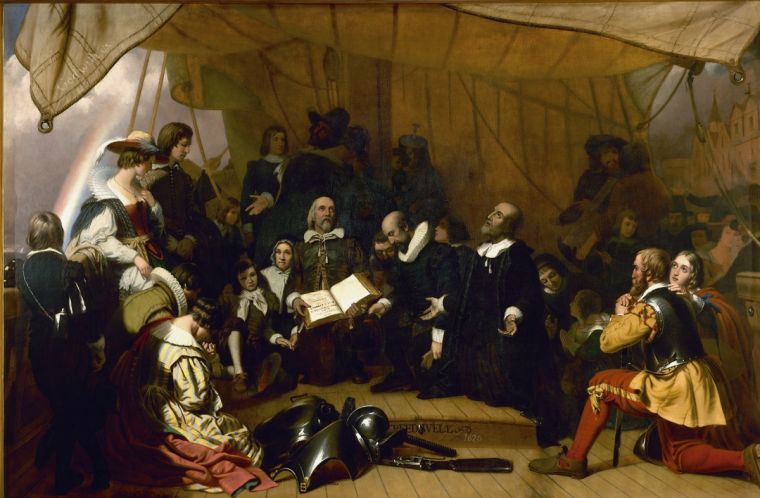Mayflower400: why the Puritans had to leave England

On 16 September 1620, 102 passengers and 30 crew set sail on the Mayflower from Plymouth, England, heading for the New World. Making the hazardous journey were the Pilgrim Fathers, a group of separatists who were dreaming of a new life, one in which they could live according to their religious beliefs without interference.
But for historian Stephen Tomkins, the most interesting journey isn't the 66 days they spent onboard the Mayflower crossing the Atlantic; it's what came before that - hence the name of his new book on the subject, The Journey to the Mayflower.
He speaks to Christian Today about the struggle of the separatists and what drove them to risk life and limb by leaving not only the Church of England, but England itself, and heading out to the New World.
CT: Looking back to the time of the Protestant Reformation, Elizabeth I is not often thought of as one of the 'bad guys' - that title often goes to Bloody Mary! But is it more nuanced than that, because under Elizabeth, the Puritans were persecuted.
Stephen: Queen Elizabeth does emerge as one of the 'bad guys' in my book because she persecuted this movement, but to be fair to her, she was a world away from Bloody Mary in that she had absolutely no interest in persecuting people just because of what they believed.
Mary rounded up Protestants and had them killed just because they wouldn't give up their Protestant faith. There's no way Elizabeth was going to do that to Catholics, and she wasn't even interested in what the radical Puritans believed. She wasn't going to try to change their minds, and she certainly wasn't going to kill them just for their beliefs.
Her problem was that the Church of England was a state Church, and England was a church state. The idea that almost all Protestants in England at this time had was that the Church was a whole Christian nation. That, I think, is key to understanding Elizabeth's attitude towards the Puritans, and it is where the separatists differed: they believed that the Church was a voluntary community.
Elizabeth, like everybody else, thought that the Church should include the entire nation, every person in England, so that when the separatists left the Church of England and started their own churches, Elizabeth - like many others - would have seen this as almost the end of the world!
The separatists were feared much like Islamist fundamentalists or communists in later times, because by leaving the state Church, the separatists were tugging at a lose thread on the fabric of England and it looked like they were threatening to pull the whole thing apart.
CT: Did the Queen feel threatened by the separatists or was it about control?
Stephen: It was absolutely a question of power. In a sense, Elizabeth had two arms of government. There was the political system and there was the Church, and so through a hierarchy of bishops and the English parish system, she had some measure of control over what happened in every single village in England. In many ways, this network of local churches and bishops spread out across the country was essential to government.
When the separatists said 'we're not going to be part of your church', that's not simply about freedom of belief; it's putting yourself outside the system. In a way, it was like saying: 'we're not going to be part of your government; you're not going to govern us anymore.' Almost as if they were setting up their own little country.
CT: This period in our history doesn't cast the Church of England in a very positive light!
Stephen: Yes, it was the Church of England that these people were escaping from! Four hundred years ago, the Church of England was a bit of a monster in many ways - in this story at least. But to be fair, it is a completely different entity now. It doesn't behave in the same way, it doesn't think in the same way - certainly not about people that are outside of its fold. We've all had to get our heads around the fact that we have to agree to disagree on a lot of things!
CT: What was the attitude of Church leaders at the time towards the separatists? Were Church of England clergy preaching against them in the pulpit?
Stephen: Yes, they were preaching against them and at this time, bishops employed constables - a kind of police force of their own - that they would send out to arrest the separatists, raid their meetings and even their houses, and take them to prison.
The Archbishop of Canterbury and the Bishop of London personally tried the separatists but they didn't have the power to execute them. They could keep them in prison as long as they wanted to and they did this, causing many separatists to die in prison. Eventually the Archbishop of Canterbury persuaded the government to pass a law making separatism a felony and that was how he got the three leaders of the movement executed in 1593. That was very much the work of the Archbishop of Canterbury, so he is another 'villain' of my book!
CT: What was it about the Church of England that the separatists just couldn't accept?
Stephen: The original reason they left was because of the great complaint that Puritans had in general with the Church of England - that it wasn't reformed enough. The focal point for that was the fact that the ministers were still supposed to wear the priestly robes of Catholic tradition and they thought that the Reformation got rid of all that. They viewed it like going back to the old ways.
Their thinking was: there are no priestly robes in the Bible, our Church should be more biblical than that. The separatists were the ones among the Puritans who felt so strongly about this that they left the Church of England and set up their own churches. They were prepared to go through all that just because of the clothes the ministers were wearing.

There were other complaints of course, like kneeling, the sign of the cross, and stained glass - basically anything that wasn't mentioned in the Bible. I imagine a lot of Christians today not having a lot of sympathy for these attitudes, but on the other hand, once they had left the Church of England over the matter of the priestly robes, that then become much less of a focus for them.
What they started to realise was that the true difference between them and the Church of England was that for them the Church was a voluntary community, a people of God. It was for Christians, true believers, people who lived out their faith, and the Church had no business forcing people to join who didn't want to, and no business punishing people who didn't go to church.
They also thought the Church should be democratic; not ruled by a monarch who could determine what happened in every church in the country. They believed the Church was the people of God and they should listen to God for themselves, and decide among themselves how God was calling them to be.
To my mind, at least, although they did not start out for the best of reasons, who they ended up being, what they ended up advocating for and why they couldn't go back to the Church of England are, I think, something quite prophetic.
CT: If we were to put ourselves back into the shoes of a separitist in England at that time, what would it have been like?
Stephen: The separatists were an underground movement so they would meet in their houses, caves, woods, fields, ships, pubs, and they worshipped in prison as well. They had an underground printing concern and wrote books in prison. They weren't supposed to have pen or paper in prison but they still managed to write maybe a few in a year.
One of their books has survived actually written in the margins of someone else's book. These manuscripts were smuggled out of prison and then taken to the Netherlands where they could be printed and then smuggled back into England again. Maybe 3,000 books a year were being smuggled by the separatists into England at this time.
So it was a serious resistance movement and underground operation. It reminds me of (Open Doors founder) Brother Andrew, 'God's smuggler' smuggling Bibles into Eastern Europe in his VW Beetle.
For the separatists too, it was a very dangerous underground operation, except that it wasn't the Bible they were smuggling but their own theological works.
And you have to remember that Elizabethan prisons were outlandishly unhealthy places. A lot of the separatists suffered and got ill in prison, and sadly died there.
CT: So it wasn't an easy choice to become a separatist?
Stephen: No, and that's why a lot of them ended up leaving the country and going to the Netherlands, where they enjoyed religious freedom. They weren't persecuted there and so it was an improvement in many ways, but obviously they were migrants in another country with all the problems that entailed. They lived in poverty and had to learn new ways of making a living. It was a serious decision and not everyone managed to pursue it to the end. Some saw it through to the end and died for their faith; others did give up and go home.

CT: Was there a single event that prompted the Puritans to decide that they just couldn't stay in England any more?
Stephen: People went at different times and for different reasons, but in terms of a single event, when separatism became a felony and the three separatist leaders were executed, it brought being an outlaw - which is what the separatists were - to a whole new level.
That was the point, really, when en masse a lot of them left the country. Their first attempt at settling North America was Newfoundland in Canada, but it didn't work out and so they settled in the Netherlands instead. The Mayflower was actually their fourth attempt to colonise North America.
CT: By the time of the Mayflower, James I is on the throne. Had there been no improvement since the days of Elizabeth I?
Stephen: Sadly, there was no improvement. They had hoped for that when James I came to the throne but almost as soon as he became king, the Archbishop of Canterbury died and he replaced him with Richard Bancroft. This new Archbishop led the campaign not so much against the separatists but against Puritans remaining in the Church of England and drove them out. That led to a whole new wave of the separatist movement because they were literally driven out of the Church. Many of them went over to the Netherlands and then eventually to New England.
CT: We often focus on the journey of the Mayflower, but your book is called the Journey to the Mayflower. Why is that?
Stephen: For me, the real story is this underground movement in England that was driven eventually to the Mayflower, the ship that sailed to New England. But it was an awful lot of work just to get to that point and, as I said earlier, the Mayflower was actually their fourth attempt at settling in North America.
You have to remember that they were based in the Netherlands and so they had to send people to England to try and sort all these things out, like getting permission, getting land etc. There was all the paperwork to sort out and of course they had to be very subtle about it; they wanted to be honest in their witness but at the same time not let on how radical they were, because they wanted the government's support in joining the settlement in Virginia. This settlement was already established; if they had landed there as originally intended, they would have been joining an officially recognised colonial enterprise.
It was by accident and bad weather that they ended up in New England, where there was no English settlement at all and they just had to work it out for themselves. That's why they were so independent and have gone down in American history, because it wasn't an English government enterprise; it was the real Puritan spirit. They were out there on their own.
CT: In order to sail to the New World, they needed the help of investors. Why was that?
Stephen: These were not people who could afford to buy their own ship. It was just too expensive. Of course, to settle in North America, you've got to take a lot of stuff with you that you're not going to find waiting for you on your arrival, like tools and weapons. That all costs money, so they needed the investment bankers of their day to put money into the enterprise.
That meant in theory being tied to these investors and working for them for however many years so that they would see a return on their investment, so sending back things like furs, skins, wood and any crops they could grow. That was supposed to be how it worked but, as I said, they ended up in New England sort of doing their own thing and having to start everything from scratch.
CT: Every step of the way, being a Puritan seems to have come at enormous personal cost. They seem to have been an incredibly determined group of people.
Stephen: Yes, and I think it's really important to understand something that's often missed out in this story: absolutely central to understanding what they did is that they believed they were called by God and were being led to the promised land.
They believed they, as the people of God, were the new children of Israel. They looked to the Bible to see the patterns in how God dealt with Israel in order to understand their own lives, and that was why they left England for the Netherlands. They did that in the belief that God was calling them out of Egypt - out of England, this land of cruelty and slavery - across the sea to a new life.
In the end, the Netherlands didn't turn out to be much of a promised land for them; life was really hard there. That's when they thought about the Exodus story a bit more and how after Israel came out of Egypt, they had the 40 years in the wilderness. They decided that was where they were now in their own lives. They had left England - Egypt - and were in the wilderness, and that meant God still had another journey in store for them. So they crossed the Atlantic in the conviction that God was leading them on.
It's hard to overstate just how crushing it would have been for them to go back to England because in the Exodus story the people who want to go back to Egypt were the ones who were turning their backs on God and his deliverance. They would have viewed returning to England like turning their back on their faith. They knew they had not reached the place God had in store for them; they couldn't go back and yet they couldn't stay where they were.
So everything about their faith told them that God was leading them on, forwards, and even though it was a terrifying, dangerous, daunting journey to cross the Atlantic, they were convinced that it was God who was calling them to do it, to reach the promised land that God had in store for them.











